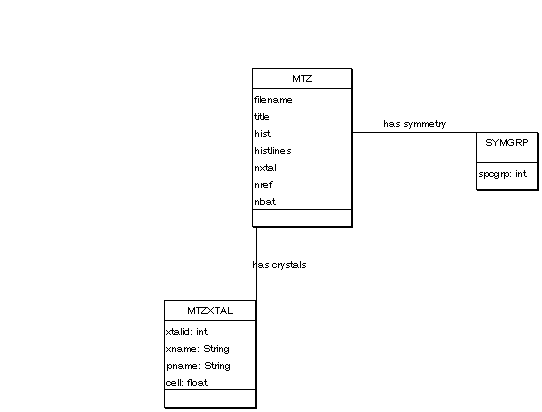CCP4 software library: Design Document
Author: Martyn Winn
Revision: 0.2
Date: 03/10/2002
Form of library
- Support functions must be available to all partial makes (CMTZ etc.).
Possibly some duplication should be allowed to support partial makes.
Naming conventions
- Fortran interface must of course follow existing naming.
- All new functions must have distinct names. In practice, we have:
- CMTZ
- Prefix "Mtz" for new functions, and "ccp4_lr" etc. for those
which are closely tied to Fortran functions. Data structures are
MTZ, MTZXTAL, MTZSET, MTZCOL.
- CMAP
- Prefix "ccp4_cmap_"
- CSYM
- Prefix "ccp4spg_"
- Unit cell conversions
- Prefix "ccp4uc_"
- CCP4 style
- Prefix "ccp4"
- System-dependent functions
- Prefix "ccp4_utils_"
Pedants would argue that these should all conform to "ccp4_".
- Namespaces are defined for C++ applications, as follows:
- CMTZ
- namespace CMtz
- CMAP
- namespace CMap_io
- CSYM
- namespace CSym
- Unit cell conversions
- namespace CCP4uc
- CCP4 style and system-dependent functions
- namespace CCP4
Coding conventions
- Return values: If a function is not returning a specific
object or pointer to an object, then it will be of type int and return
an error status. The convention is that 1 represents success, and 0
represents failure.
Error handling and debugging
Contract - Error handling based upon standard C libraries. Information
to be made available to calling routines via defined return status and
error code. Library to contain error code with accessor functions.
The response is left to the calling routines, except in FORTRAN
wrappers).
ccp4_errno.h defines error state ccp4_errno, so are separate
from system errno. This takes the form:
| 12 bits (system) | 4 bits (level) | 16 bits (code) ||
and is set in ccp4_signal(). ccp4_errno is externally visible.
Error message strings are set statically allocated in library_err.c,
and made accessible by ccp4_strerror (cf strerror) and ccp4_error
(cf perror).
ccp4_errno is set by ccp4_signal(int error_code, char msg, void
(*callback)() ) which allows callback (extend to pass data and return
void *?).
Non-integrated routines ccperror().
Support for scripting
Class and struct members must be made available to scripting
languages, and this is done in a variety of ways:
- Generation of shadow classes, as in python interface to MMDB.
- Use of SWIG-generated accessor functions for structs (not tried yet).
- Explicit accessor functions. cmtzlib.c has a number of these
(e.g. MtzColType). When implemented at the C level, these
are accessible to all applications. However, it may be that they
are only useful for Tcl, in which case they could be implemented
as SWIG inline functions.
CMTZ
- Central role is to read an MTZ file, manipulate the contents
in memory, and to write out to a new MTZ file if desired. Applications
have access to the data structure either directly or through accessor
functions.
- Reflection data can be held in memory or on disk.
- cmtzlib_f contains static arrays to link the Fortran MINDX to
specific structures in memory.
- Columns of data are in general identified by a full path
/crystal/dataset/column although a bare column can
be used provided it is unique.
- The tcl interface provides direct access to MTZ data structures
from tcl scripts. The data structures cannot be navigated at the tcl
level, and sufficient accessor functions should be provided.
Here is an incomplete diagram of MTZ header structure:

Comparisons with Fortran API of CCP4 4.2
The aim is to continue to support the legacy Fortran API. However, there
are some subtle differences:
- Column ordering: Rather than order columns in the MTZ file according
to the time they were created, the columns are grouped by crystal and dataset.
Thus, when additional columns are "appended" they may in fact be inserted so
that they belong to the appropriate dataset. Therefore, avoid assumptions
about column ordering in the file.
CMAP
Minimum Contract - C style io access to mapfile. Read data into program
specified arrays. Replication of FORTRAN API.
Mapfile described by C-structure (currently flat), representing header
plus additional information for parsing. This is accessible by
accessor functions.
Logical breakdown of file into header, symops, sections, rows, and
data. Read, Write and Seek access to be given to symops, etc ...
CSYM
- Extensive spacegroup information is held in a flat file syminfo.lib.
This file is generated from cctbx with the addition of CCP4 spacegroup
numbers and real space ASUs where appropriate. The file holds data for
non-standard settings.
- Spacegroups are identified by standard number, CCP4 number, or list
of operations, and data for that spacegroup read into memory.
- Some data is calculated on the fly, e.g. centric and epsilon zones.
- csymlib_f contains static arrays to link subroutine calls to structures
in memory.
Unit cell
- Contains manipulations of cell parameters and orthogonal to
fractional transformations. Taken mainly from old rwbrook.
CCP4 style
- Contains functions to give CCP4-style command line interface, CCP4
banner, etc.
- Aim to reproduce traditional CCP4 look-and-feel.
System-dependent functions.
IO routines
Minimum Contract - extend and rationalise current io library to give
additional file information.
Wraps buffered (FILE) and unbuffered (fp) access. All access allowed
as items or raw bytes. Maintains information on status of file,
including length, location and error status. Adds byte swapping on
write to allow appending to a non-native file. File mode is set by
fopen() style character mode.
Ability to get/put/unget (not implemented).
Wrapping of FILE based buffer control (not implemented).

